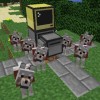This program is NO WHERE NEAR finished and will not do anything if it is in good shape as it is
i know there are other methods i can do to make this but that is not what im focusing on so please if you can just help me here
also I know that there are probably many errors in this code some of which are just plane obvious but that is mostly me
being an idiot and forgetting syntax but anyways here is my problem
I am making a demo and I have run into a problem…
I have tested this in another program so i know that is should work no problems but it wont work for me here
The error I am getting is this 85: index expected, got nil
I have scanned the code many times and i am aggravated at the fact it is doing this and here is my code
Spoiler
1: arg = {...}
2: if arg[1] then
3: level = arg[1]
4: run = true
5: else
6: print("Usage: a levelfile")
7: run = false
8: end
9:
10: if fs.exists(level) == false then
11: run = false
12: print("not a file")
13: end
14:
15: -- b = block s = start e = end w = wall
16: --read from file and print to screen
17:
18: --read to find start and end pos
19: if run then
20: movecost = 10
21: watermovecost = 20
22: Li = 0
23: file = fs.open(level,"r")
24: endboolean = false
25: startboolean = false
26: go = false
27: openlist = {}
28: closedlist = {}
29: w,h = term.getSize()
30: while go == false do
31: str = file.readLine()
32: --print(endboolean)
33: --print(startboolean)
34: --print(str)
35: s,e = str:find("E")
36: Li = Li + 1
37: if s ~= null then
38: endboolean = true
39: endpoint = {s,Li}
40: --print(s)
41: --print(Li)
42: --print("end = true")
43: end
44: s2,e2 = str:find("S")
45: if s2 ~= nul then
46: startboolean = true
47: startpoint = {s2,Li}
48: --print(s2)
49: --print(Li)
50: --print("start = true")
51: end
52: if startboolean and endboolean then
53: go = true
54: file.close()
55: end
56: end
57: --print(startpoint[1])
58: --print(startpoint[2])
59: --print(endpoint[1])
60: --print(endpoint[2])
61: function gettype(str)
62: if str == "O" then
63: return "water"
64: elseif str == " " then
65: return "air"
66: elseif str == "W" then
67: return "wall"
68: end
69: end
70: if go then
71: -- finding out the data for each cell
72: -- and then getting the data
73: sx = tonumber(startpoint[1])
74: sy = tonumber(startpoint[2])
75: ex = tonumber(endpoint[1])
76: ey = tonumber(endpoint[2])
77: filel = fs.open(level,"r")
78: x = 1
79: y = 1
80: cell = {}
81: for y = 1,w do -- for each cell do
82: cell[y] = {}
83: stringl = filel.readLine()
84: for x = 1,h do
85: cell[x][y] = {}
86: --calculate heuristic
87: dx = math.abs(ex - x)
88: dy = math.abs(ey - y)
89: h = dx + dy
90: cell[x][y].h = h-1
91: ce = stringl:sub(y,y)
92: cell[x][y].type = gettype(ce)
93: end
94: end
95: filel.close()
96: --[[ starting the search ]]--
97: --adding the start to the open list
98: -- open list will store cells like:
99: -- referencing will be like openlist[1] = {1,2)
100: -- x = openlist[1][1]
101: -- y = openlist[1][2]
102: function lowest(listing)
103: for finding,lists in pairs(listing) do
104: --lists will be like {x,y}
105: local cx = lists[1]
106: local cy = lists[2]
107: if checklist(cx,cy,closed) == false then
108: if cell[cx][cy].f < best then
109: best = cell[cx][cy].f
110: bestcell = {cx,cy}
111: end
112: end
113: end
114: end
115: function find(xx,yy)
116: if cell[xx-1][yy].type ~= "wall" then
117: openlist[table.maxn(openlist)+1] = {xx-1,yy-1}
118: cell[xx-1][yy].parent = {xx,yy}
119: cell[xx-1][yy].g = cell[xx][yy].g + movecost
120: cell[xx-1][yy].f = cell.cell[xx-1][yy].h + cell[xx-1][yy].g
121: end
122: if cell[xx+1][yy].type ~= "wall" then
123: openlist[table.maxn(openlist)+1] = {xx-1,yy-1}
124: cell[xx+1][yy].parent = {xx,yy}
125: cell[xx+1][yy].g = cell[xx][yy].g + movecost
126: cell[xx+1][yy].f = cell.cell[xx+1][yy].h + cell[xx+1][yy].g
127: end
128: if cell[xx][yy+1].type ~= "wall" then
129: openlist[table.maxn(openlist)+1] = {xx-1,yy-1}
130: cell[xx][yy-1].parent = {xx,yy}
131: cell[xx][yy-1].g = cell[xx][yy].g + movecost
132: cell[xx][yy-1].f = cell.cell[xx][yy-1].h + cell[xx][yy-1].g
133: end
134: if cell[xx][yy-1].type ~= "wall" then
135: openlist[table.maxn(openlist)+1] = {xx-1,yy-1}
136: cell[xx][yy+1].parent = {xx,yy}
137: cell[xx][yy+1].g = cell[xx][yy].g + movecost
138: cell[xx][yy+1].f = cell.cell[xx][yy+1].h + cell[xx][yy+1].g
139: end
140: end
141: function toclosed(xx,yy)
142: local n = 0
143: while found == false do
144: n = n + 1
145: if openlist[n].x == xx then
146: if openlist[n].y == yy then
147: table.remove(openlist,n)
148: closedlist[table.maxn(closedlist)+1] = {xx,yy}
149: end
150: end
151: end
152: end
153: function checklist(x,y,list)
154: for j,k in pairs(list) do
155: if k[1] == x then
156: if k[2] == y then
157: return true
158: else
159: return false
160: end
161: else
162: return false
163: end
164: end
165: end
166: -- finding starts here
167: openlist[1] = {sx,sy}
168: cell[sx][sy].g = 0
169: find(sx,sy)
170: toclosed(sx,sy)
171: -- find lowest f value on the open list to choose for checking
172: best = 999999999999999999999999999999999999999
173: lowest(openlist)
174: -- drop the bestcell from the openlist and add it to the closed list
175: toclosed(bestcell[1],bestcell[2])
176: --Check all of the adjacent squares. Ignoring those that are on the closed list or unwalkable (terrain with walls, water, or other illegal
177: --terrain), add squares to the open list if they are not on the open list already. Make the selected square the “parent” of the new squares.
178: find(bestcell[1],bestcell[2])
179: --If an adjacent square is already on the open list, check to see if this path to that square is a better one. In other words, check to see
180: --if the G score for that square is lower if we use the current square to get there. If not, don’t do anything.
181: --On the other hand, if the G cost of the new path is lower, change the parent of the adjacent square to the selected square (in the diagram
182: --above, change the direction of the pointer to point at the selected square). Finally, recalculate both the F and G scores of that square.
183: --If this seems confusing, you will see it illustrated below.
184: end
185: end
Anyways if you could tell me what im doing wrong I would appreciate it sooooooooo much and be ultimately grateful
thank you


